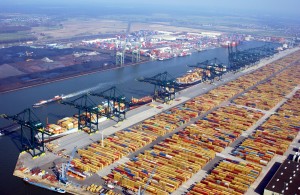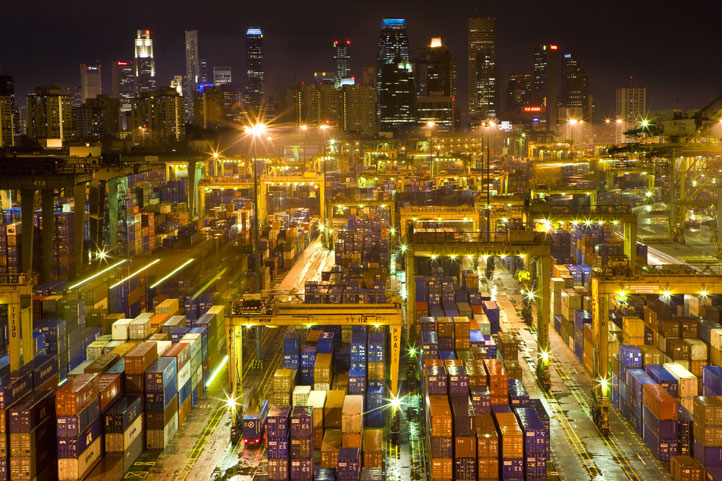Glasgow Calling!
To some, shipping and Scotland go hand in hand. Be it with folkloric tales of little fishing boats in foggy firths or lochs, liners in the 19th century carrying immigrants looking for prosperity in the new world, or massive shipyards powering the United Kingdom to naval supremacy, Scottish history has been entwined with the sea.
Times have changed since the Industrial Revolution, when Scotland’s main contribution was the building of steel hulled ships. Indeed, shipbuilding, especially on the river Clyde in Glasgow, increased dramatically at the end of the 19th century and by 1913, 18% of the world’s ships were built there. Of course, eventually the competitive rates and low wage work has since then moved elsewhere, and what was once a smoggy factory-saturated waterway is today a canal surrounded by new office buildings, bike paths, and ultra-modern museums and theaters.
As times have changed, the business has adapted. When I was sent on a business trip to Scotland in fall 2011 representing the marine credit department, it was to observe a new breed of marine company, the “ship-manager”. As part of a joint visit with Sales, Customer Service, and Treasurer’s, we visited the offices of 3 of the biggest of these companies in the world.
We were lucky enough to fly into Edinburgh, 60km east of Glasgow, and to stay in a hotel on the “Royal Mile”. Edinburgh, for those who haven’t been, is a picturesque medieval city topped with a massive castle perched on top of a cliff. The Royal Mile is a street that runs up from the castle gates all the way down to a large Abbey at the foot of the hill. As you can imagine, it is freezing but regardless is a must see as it is filled with historic monuments, street performers, boutiques, restaurants and, of course, bars. One way to keep you warm (after business hours of course) is to try as many of the local whiskeys as possible. Since the beer is average at best in Scotland (sorry to all this may offend), this at least in my opinion is a good alternative.
From dawn until dusk, the main portion of the trip was dedicated to the ship-manager company visits in Glasgow, which was an hour’s drive away. When we arrived to what would be the first of our three customer visits that day, I realized that this was the real deal. Numbers and names in computers systems and reports were materializing into something tangible.
As credit analysts, we are expected to thoroughly understand the details and structure of specific companies our company trades with, along with the economic environment they operate in. This allows us to understand with the most precision what risk the business line is taking by offering credit to a certain company. The dissection of financial information of a company plays an elemental role in the decision making of whether a client is trustworthy enough to pay us back when their invoices are due. As such, when it is deemed meeting a customer face to face will help increase the gathered information and grow credit capacity, we are sent out from Prague on business trips.
The marine business has been around much longer than modern finance and is often still very traditional. Also, as it is an international business, companies tend to register offshore to avoid having to reveal information. It is important for us to make a customer realize that opening up to us will usually mean a closer business relationship.
A “ship-manager” is essentially a company which takes care of supplying a vessel with everything it needs without owning it (such as lubricants, crew and food). A comparison would be a taxi company: the company pays the driver, the gas and other expenses needed for operation, but often the car is owned by someone else. For this reason, the characteristic of a ship-manager is to have very small assets (as they don’t own vessels) and a business scheme that relies on margins made from reselling products that they buy in bulk. However, since the cash they pay us with depends on their clients paying them, the actual risk of ultimately not getting paid lies therefore with the individual vessel owner, and not the ship-manager itself.
This concept is fundamental to understand in order to justify granting credit lines worth millions of dollars for companies that only own small Glasgow offices, a few computers and furniture supplies. The information I obtained to further deepen our marine department’s knowledge on the internal affairs of these companies proved to be very insightful and led to substantial credit line increases while also reinforcing our trust with the business model.
Working in the marine business while located in landlocked Czech Republic can create a certain disconnect between a credit analyst and shipping. As fascinating as this market is, seeing first-hand the history surrounding the industry and the way today’s leading players operate adds a new dimension to understanding maritime economics. To some, shipping and Scotland go hand in hand.



